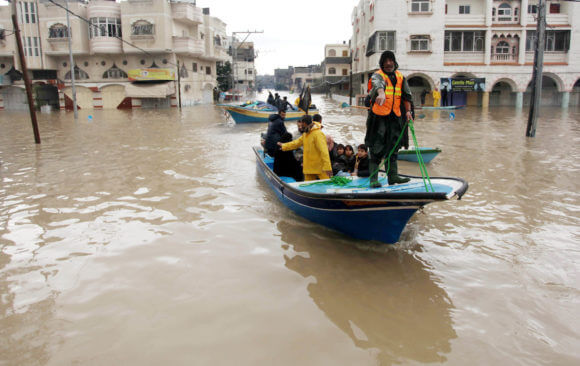We in Palestine and activists around the world are not satisfied with the progress to address this existential crisis. We are not merely in a "climate emergency" but in a global catastrophe -- an environmental Nakba.
NOVEMBER 4, 2021
 PALESTINIAN CIVIL DEFENSE VOLUNTEERS HELP PEOPLE TO TRAVEL ACROSS FLOOD WATERS IN GAZA CITY FOLLOWING RAIN STORMS, ON DECEMBER 14, 2013. A FIERCE WINTER STORM SHUT DOWN MUCH OF THE MIDDLE EAST AT THAT TIME, BURYING JERUSALEM IN SNOW, AND FLOODING PARTS OF GAZA. (PHOTO: ASHRAF AMRA/APA IMAGES)
PALESTINIAN CIVIL DEFENSE VOLUNTEERS HELP PEOPLE TO TRAVEL ACROSS FLOOD WATERS IN GAZA CITY FOLLOWING RAIN STORMS, ON DECEMBER 14, 2013. A FIERCE WINTER STORM SHUT DOWN MUCH OF THE MIDDLE EAST AT THAT TIME, BURYING JERUSALEM IN SNOW, AND FLOODING PARTS OF GAZA. (PHOTO: ASHRAF AMRA/APA IMAGES)
Editor’s Note: The following statement was issued by the Palestine Institute for Biodiversity and Sustainability on the occasion of the UN Climate Change Conference (COP26) currently underway in Glasgow, Scotland.
 PALESTINIAN CIVIL DEFENSE VOLUNTEERS HELP PEOPLE TO TRAVEL ACROSS FLOOD WATERS IN GAZA CITY FOLLOWING RAIN STORMS, ON DECEMBER 14, 2013. A FIERCE WINTER STORM SHUT DOWN MUCH OF THE MIDDLE EAST AT THAT TIME, BURYING JERUSALEM IN SNOW, AND FLOODING PARTS OF GAZA. (PHOTO: ASHRAF AMRA/APA IMAGES)
PALESTINIAN CIVIL DEFENSE VOLUNTEERS HELP PEOPLE TO TRAVEL ACROSS FLOOD WATERS IN GAZA CITY FOLLOWING RAIN STORMS, ON DECEMBER 14, 2013. A FIERCE WINTER STORM SHUT DOWN MUCH OF THE MIDDLE EAST AT THAT TIME, BURYING JERUSALEM IN SNOW, AND FLOODING PARTS OF GAZA. (PHOTO: ASHRAF AMRA/APA IMAGES)Editor’s Note: The following statement was issued by the Palestine Institute for Biodiversity and Sustainability on the occasion of the UN Climate Change Conference (COP26) currently underway in Glasgow, Scotland.
Mondoweiss occasionally publishes press releases and statements from organizations in an effort to draw attention to overlooked issues.
Statement from the Palestine Institute for Biodiversity and Sustainability on COP26 and the “Climate Emergency”
Conference of Parties (COP) 26 (the 26th!) on climate change is underway in Scotland with over 50,000 people attending online or in person. The UN Secretary General talked about the climate “emergency” and how we are treating our planet “like a toilet.” He and other world politicians are starting to use language that we as activists have used for decades (except we were also acting). We in Palestine and activists around the world are thus not satisfied with the progress to address this existential crisis.
We are not satisfied with the blah blah blah of politicians as Greta Thunberg noted. Millions of us have been working hard to change local situations and lobbying our own and global politicians (i.e. thinking globally and acting locally and globally as the world is interconnected). We obviously need and must do more and accelerate this. We are not merely in a “climate emergency” but in a global catastrophe (an Environmental Nakba). We only have 7 years to act at much higher levels. Significant sums of money are being pledged for climate change adaptation and mitigation and for conservation. Yet, money is being misdirected and used mainly to alleviate the guilty conscience of rich countries who exploited and continue to exploit others (dumping money at the problem is not a solution). We have argued in a number of meetings in the past few weeks (about 3 meetings weekly) in the lead to COP26 that among others, these things are needed:
1) Liberate minds from mental colonization. This goes beyond the issue of “environmental awareness and education”. It goes to issues of learning and empowerment for liberation. Liberating minds from notions of powerlessness and subservience to political leaders. It is nothing short of revolutionary liberation from old ways that shackle brains and developing new paradigms for sustainability and coexistance (with each other and with nature). It involves developing RESPECT (for ourselves, for others, for nature)
2) We cannot go back to a pre-COVID19 systems of governance and world structures. The systems dominating world economies like consumerism and capitalism must be changed to develop systems based on caring, empathy, and collaboration both across borders (which eventually should be dismantled) and within borders. A better world is possible.
3) We must use our indigenous knowledge, practices, and value systems. Using technology that works together with these should create food sovereignty while protecting the environment.
4) We have to have environmental justice. People should be entitled to clean air, clean water, and a healthy environment all around. [see also the Universal Declaration of Human Rights for basic rights]
5) We need human capacity building especially in developing countries including restructuring of educational systems at all levels. For example universities now kill creativity & innovation and create conformist consumers instead of helping young people become better innovative citizen activists!
Just as one example of action towards these among hundreds of thousands around the world, we can cite the work of our Palestine Institute for Biodiversity and Sustainability at Bethlehem University (PIBS, see palestinenature.org and our 2020 annual report).
For conservation issues in Palestine, see here and our group statement and action plan from “Palestine Action for the Planet”.
We (PIBS with the Environmental Quality Authority and other stakeholders) are now working very hard on the National Biodiversity Strategy and Action Plan for Palestine (despite the ongoing colonization). It is a lot of work in order to be successful to preserve our human and natural resources.
We can use your partnership and friendship.
Again please read “Palestine Action for the Planet”, and contact us here.
No comments:
Post a Comment